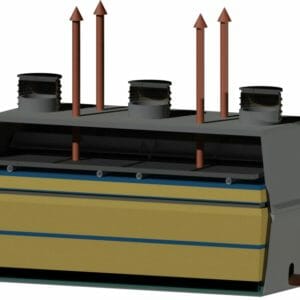Subtotal: $75.00
- Course No E – 3031
- PDH Units: 8
No data found for Custom Course Number
No data found for Custom Course Units
Intended Audience: Architecture Engineers
PDH UNITS: 8
This comprehensive course explores the transformative impact of artificial intelligence on architectural engineering, providing students with both theoretical foundations and practical applications across the building lifecycle. The course examines how AI technologies, from machine learning and computer vision to natural language processing and generative design, are revolutionizing how buildings are conceived, designed, constructed, and operated. Through a structured exploration of key application domains, students will develop critical understanding of both the capabilities and limitations of current AI systems in architectural contexts.
The course begins with fundamental AI concepts and the historical evolution of computational approaches in architecture, establishing a common vocabulary and conceptual framework. Building on this foundation, students explore AI-enhanced design processes including generative systems, multi-objective optimization, and human-AI collaborative frameworks that expand creative possibilities while maintaining human judgment. The integration of AI with Building Information Modeling is examined in depth, covering automated model generation, semantic enrichment, and predictive capabilities that transform static documentation into intelligent building representations.
Sustainable design applications receive particular attention, with detailed coverage of AI approaches to energy modeling, building envelope optimization, HVAC control, day-lighting analysis, and embodied carbon reduction. Construction applications demonstrate how AI enhances planning, resource optimization, quality control, risk management and cost estimation throughout the building delivery process. For existing buildings, students explore intelligent building management systems, occupancy analytics, environmental quality optimization, and predictive maintenance strategies that improve operational performance.
The course extends beyond building scale to examine urban applications—data analytics, transportation modeling, infrastructure planning, and climate resilience strategies that leverage AI to address complex urban challenges. Technical implementation is complemented by thorough examination of ethical considerations including data privacy, professional liability, employment impacts, equity concerns, transparency requirements, and the fundamental balance between automation and human creativity.
By course completion, students will possess both theoretical understanding and practical knowledge necessary to evaluate, implement and responsibly apply AI technologies in architectural engineering practice. Whether preparing for immediate application of existing tools or anticipating emerging technologies, students will develop the critical thinking skills needed to navigate this rapidly evolving technological landscape while maintaining architectural practice's core values and responsibilities.
Learning Objectives:
At the successful conclusion of this course, you will learn the following knowledge and skills:- Explain fundamental AI concepts and approaches relevant to architectural engineering, including machine learning, neural networks, computer vision, and natural language processing.
- Evaluate how AI tools can enhance architectural design processes while maintaining appropriate balance between computational capabilities and human creativity.
- Analyze the integration potential between AI technologies and Building Information Modeling systems across the building lifecycle.
- Apply AI-driven approaches to sustainability challenges including energy efficiency, embodied carbon reduction, and climate resilience.
- Assess how construction processes can be optimized through AI applications in scheduling, resource management, quality control, and cost estimation.
- Identify opportunities for implementing AI in building operations including intelligent control systems, occupancy analytics, and predictive maintenance.
- Examine ethical considerations in architectural AI implementation including data privacy, professional liability, equity concerns, and transparency requirements.
- Develop strategies for successful implementation of AI technologies in architectural practice, considering technical, organizational, and educational requirements.
- Critically evaluate emerging technologies including robotics, quantum computing, blockchain, and neuromorphic systems for their potential architectural applications.
- Formulate a personal perspective on how AI might shape the future of architectural practice while maintaining core professional values and responsibilities.
Once completed, your order and certificate of completion will be available in your profile when you’re logged in to the site.
Ethics Courses

E – 1869 Engineering Ethics: “Avoid Deceptive Acts” and the Case of MacArthur Maze Fire Collapseby Dr. Abolhassan Astaneh-Asl, Professor Emeritus. Ph.D., PE

E – 2040 Engineering Ethics: “Hold Safety Paramount” to Prevent Loss of Life – the Case of the Ford Pinto Firesby Dr. Abolhassan Astaneh-Asl, Professor Emeritus. Ph.D., PE


 E - 1104 Domestic Wastewater Treatment Overview
E - 1104 Domestic Wastewater Treatment Overview 







